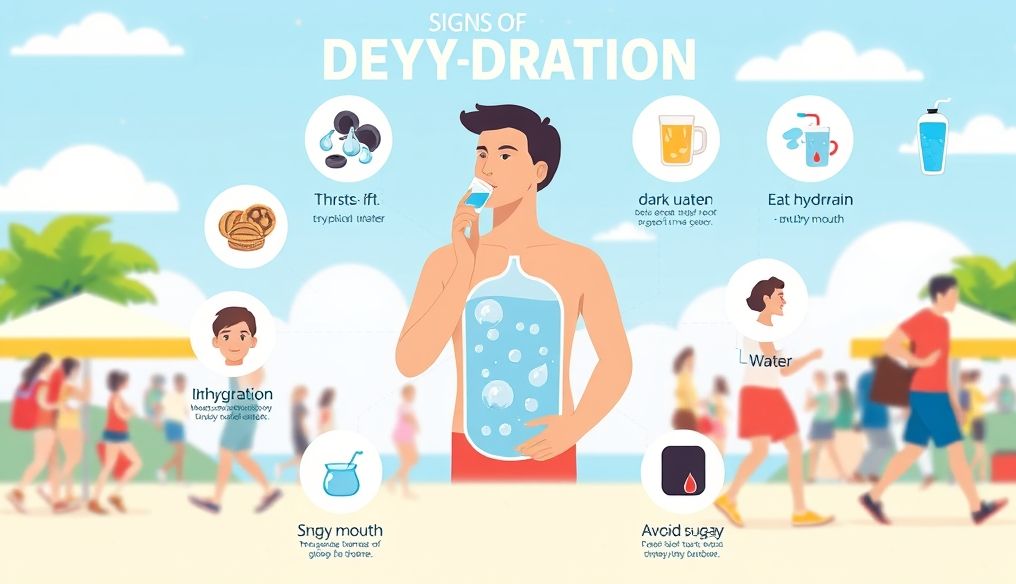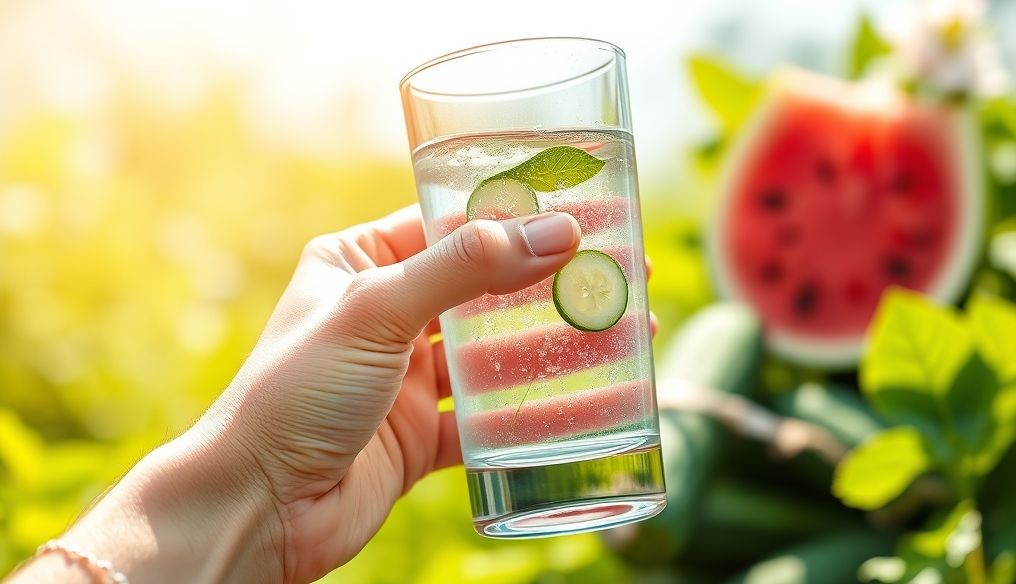What is Dehydration and How Does it Happen?
Dehydration occurs when the body loses more fluids than it replenishes. This can be due to several factors such as:
- Excessive sweating due to exercise or hot weather.
- Not drinking enough water throughout the day.
- Diarrhea or vomiting, which lead to rapid fluid loss.
- Certain medical conditions like diabetes.
- Taking certain medications that increase urination.
When the body loses fluids, it experiences a decrease in blood volume, which affects the function of vital organs such as the heart, kidneys, and brain.
Signs and Symptoms of Dehydration: How to Recognize Them Early?
Recognizing the early signs of dehydration is crucial to prevent the condition from worsening. Common signs include:
- Extreme thirst: This is the first and most important sign that the body needs fluids.
- Dry mouth and throat: Indicates a lack of moisture in the mucous membranes.
- Reduced urination or dark urine: Indicates that the kidneys are trying to retain fluids.
- Headache and dizziness: Can occur due to decreased blood volume and its effect on the brain.
- Fatigue and exhaustion: Resulting from insufficient fluids to transport oxygen and nutrients to cells.
- Constipation: Due to lack of fluids needed to soften the stool.
- Dry skin: The skin loses its elasticity and becomes dry and rough.
- Low blood pressure: Can lead to dizziness and fainting.
Stages of Dehydration: From Mild to Severe
Dehydration can be classified into three main stages:
- Mild dehydration: Includes symptoms such as mild thirst, dry mouth, and slight decrease in urination. It can be easily treated by drinking water and other fluids.
- Moderate dehydration: Symptoms include headache, dizziness, fatigue, and dark urine. It may require drinking oral rehydration solutions.
- Severe dehydration: Considered a medical emergency requiring immediate intervention. Symptoms include confusion, loss of consciousness, rapid heartbeat, rapid breathing, and severe low blood pressure. The patient should be taken to the hospital to receive intravenous fluids.
Who is More Prone to Dehydration?
Certain age groups and individuals are more prone to dehydration than others:
- Infants and young children: They have a higher percentage of fluids in their bodies and lose them more quickly. They also rely on others to provide them with fluids.
- Older adults: May experience a decreased sense of thirst and may be taking medications that increase the risk of dehydration.
- Athletes: Lose large amounts of fluids through sweating during exercise.
- People with chronic diseases: Such as diabetes and kidney disease, as these diseases increase the risk of fluid loss.
- People living in hot regions: Are exposed to fluid loss due to excessive sweating.
How to Prevent Dehydration: Practical Tips and Guidelines
Prevention is key to avoiding dehydration. Here are some practical tips and guidelines:
- Drink enough water daily: The general rule is to drink at least 8 cups of water daily, but you may need more depending on your activity level and weather conditions.
- Eat foods rich in water: Such as fruits and vegetables (watermelon, cucumber, tomatoes, lettuce).
- Drink fluids before, during, and after exercise: To replenish fluids lost through sweating.
- Avoid diuretic beverages: Such as caffeine and alcohol, as they increase fluid loss.
- Wear loose-fitting, light-colored clothing: To help keep the body cool.
- Stay in cool, shaded places: Especially during peak heat hours.
- Monitor urine color: Urine should be light in color, and if it is dark, it means you need to drink more fluids.
- Be cautious when traveling to hot regions: And make sure to drink enough water.
Beneficial Hydrating Drinks: What to Drink and When?
In addition to water, there are many other drinks that can help maintain body hydration:
- Water: Is the best and most effective option for hydration.
- Sports drinks: Contain electrolytes that help replenish salts lost through sweating.
- Natural fruit juices: Provide fluids, vitamins, and minerals.
- Herbal teas: Such as chamomile and peppermint tea, which are caffeine-free and soothing.
- Coconut water: Contains natural electrolytes and is a refreshing option for hydration.
- Oral rehydration solutions: Used to treat dehydration caused by diarrhea or vomiting, and contain an ideal balance of water, salts, and sugar.
When Should You Seek Medical Help?
In some cases, dehydration may be severe and require immediate medical intervention. You should seek medical help if you experience the following symptoms:
- Confusion or loss of consciousness.
- Inability to drink or retain fluids.
- Rapid heartbeat or rapid breathing.
- Severe low blood pressure.
- Seizures.
You should also seek medical help if you are caring for someone who is dehydrated and has severe symptoms or if symptoms do not improve after drinking fluids.
Dehydration and Public Health: Its Impact on Body and Mind
Dehydration not only affects the body but also the mind. Dehydration can lead to:
- Decreased concentration and attention.
- Impaired memory.
- Increased feelings of fatigue and exhaustion.
- Mood swings.
- Difficulty making decisions.
Therefore, it is important to stay hydrated to maintain the health of the body and mind.
Common Myths About Dehydration: Facts You Should Know
There are many common myths about dehydration that need to be corrected:
- Myth: Only athletes need to drink a lot of water. Fact: Everyone needs to drink enough water to stay hydrated.
- Myth: If you're not thirsty, you're not dehydrated. Fact: Thirst is not always a reliable indicator of dehydration, especially in older adults.
- Myth: All drinks are equally hydrating. Fact: Some drinks, such as caffeine and alcohol, can increase fluid loss.
- Myth: You can get all the fluids you need from food. Fact: While some foods are rich in water, you still need to drink water and other fluids to stay hydrated.
By following these tips and guidelines, you can protect yourself and your family from dehydration and enjoy good health.




